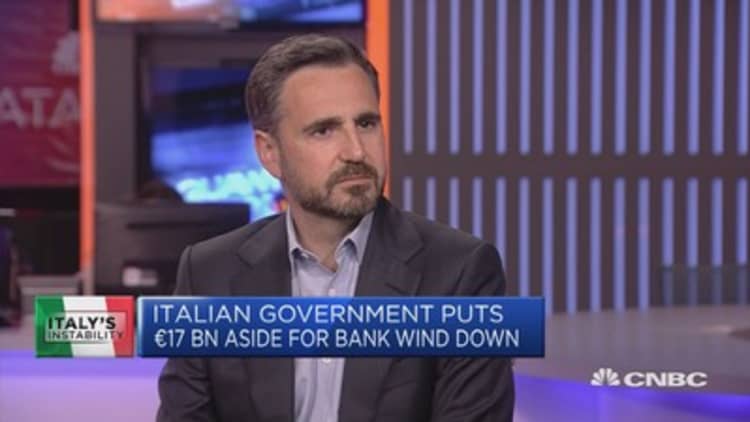
Italy's banking stocks led European equity markets higher on Monday as investors reacted with enthusiasm to confirmation that the Italian government would ride to the rescue of two flailing regional banks.
However, detractors of the deal agreed principally between the European Commission, the Italian government and the country's second-largest lender, Intesa Sanpaolo (which will accept state help to buy the banks' sound assets), have criticized the liberal interpretation of the European Union's rules, saying it has destroyed the credibility of the bloc's banking union.
"With this decision, the European Commission accompanies the Banking Union to its deathbed. The promise that the taxpayer will not stand in to rescue failing banks anymore is broken for good," bewailed German MEP (member of European Parliament) Markus Ferber in a statement on Sunday.
Italian Economy Minister Pier Carlo Padoan told reporters on Sunday, however, that the critics should pipe up with a better solution if they could see one – which he himself couldn't.
Indeed, the recent purchase of failing Spanish lender Banco Popular by larger peer Santander is being contrasted with Italian situation by observers who note the principal differences between the two resolutions – namely, the protection of Spain's taxpayers contrasted with the protection of some of Italy's private investors.

The Italian government could be on the hook for up to €17 billion ($19 billion) having saved senior bondholders and depositors in the failing Banca Popolare di Vicenza and Veneto Banca and ensuring that Intesa Sanpaolo's investors would suffer no worsening of capital ratios. This again contrasts with Santander whose shareholders had to endure a multi-billion euro equity dilution.
Despite the cries of double standards, Marco Elser, head portfolio manager at Lonsin Capital, told CNBC's Street Signs on Monday that "This is arguably a template of how restructurings should be done."
Indeed, the European Central Bank (ECB) actually learnt a lot from the Banco Popular situation in Spain, according to Kian Abouhossein, head of EMEA Banking Research at JPMorgan, namely:
"That it is in the interests of involving the government to take on some of the capital hits in order to clean up the system and give up the good assets of a banking system back to the overall private banking system," he said, speaking on CNBC's Squawk Box on Monday.

Agreeing that this was a positive development for Italy's overall banking system which is still weighed down by around 300 billion of bad loans, Eric Lonergan, fund manager at M&G, argued that the emphasis placed by the deal's proponents on the need to safeguard the Venetian economy is overplayed but necessary in this case.
"Finally there's some pragmatism…they have to exaggerate significance to get away with state aid," he contended, referring to the justification being cited for protecting senior bondholders and depositors, many of whom are local customers of the failing banks which are located in the relatively prosperous north-eastern corner of Italy.
"Italy is in the early stages of an economic recovery. They absolutely should not do anything to threaten that, they need to encourage it," he added.
However, while the outcome is positive overall, according to Lorenzo Codogno, founder & chief economist at LC Macro Advisors, the terms could have been tweaked to allow senior debt investors to have weathered some pain without destabilizing the system.
"A small haircut of senior bondholders would have been acceptable in my view - it would have not undermined financial stability," Codogno posited to CNBC's Squawk Box on Monday.


